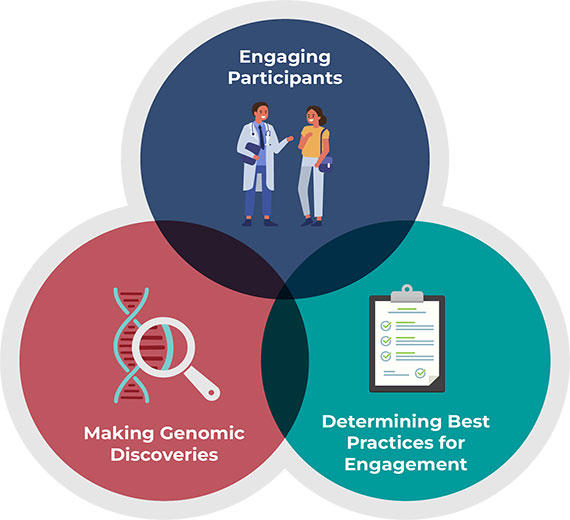On this page...
Overview

The first of its kind, the Participant Engagement and Cancer Genome Sequencing (PE-CGS) Network is a collaborative effort between researchers and participants that will lead to new discoveries in cancer genomics.
Despite the successes of research into the genomic alterations in tumors, including findings from The Cancer Genome Atlas (TCGA), significant research gaps remain. One strategy for addressing these research gaps is through direct participant engagement.
The PE-CGS network aims to promote and support direct engagement of cancer patients and post-treatment cancer survivors as participants in cancer research by using the following methods:
- Determining best practices for engaging and communicating with participants, while also responding to participant preferences in genomics research.
- Improving understanding of the molecular changes associated with cancer to provide insights into cancer biology.
The scientific insights generated by these efforts could be applied to opportunities for cancer prevention, improvement of methods of cancer diagnosis, or development of new cancer therapies.
Currently Funded Projects
The PE-CGS Network is made up of one Coordinating Center and multiple Research Centers. Each Research Center has an Administrative Core and three units: the Participant Engagement Unit, the Genome Characterization Unit, and the Engagement Optimization Unit.
| Research Center | Cancer Focus | Population Focus |
|---|---|---|
| Count Me In PE-CGS Center Broad Institute, Dana-Farber Cancer Institute, Boston Children’s Hospital |
Leiomyosarcoma, osteosarcoma | Children, adults |
| Engagement of American Indians of Southwestern Tribal Nations in Cancer Genome Sequencing University of New Mexico, the Mayo Clinic, the Translational Genomics Research Institute (TGen), Black Hills Center for American Indian Health |
Various cancers | American Indians of Southwestern Tribal Nations |
| OPTimizing engageMent in Discovery of Molecular Evolution of Low Grade Glioma (OPTIMUM) Yale University, University of Colorado, Jackson Laboratory for Genomic Medicine, Brigham and Women’s Hospital, and Beth Israel Deaconess Medical Center |
Low-grade glioma | Young to middle-aged adults |
| Center for Optimization of Participant Engagement for Cancer Characterization (COPECC) University of Southern California |
Colorectal cancer | Hispanics/Latinos |
| WU-PE-CGS Washington University in St. Louis |
Multiple myeloma, cholangiocarcinoma, colorectal cancer | Adults with cholangiocarcinoma, Black Americans under age 65 with colorectal cancer, Black Americans with multiple myeloma |
| PE-CGS Coordinating Center at The Ohio State University provides administrative and scientific support to the network’s researchers and participants. |
Scientific Contacts
Please direct all inquiries about the network to Leah E. Mechanic at mechanil@mail.nih.gov.

Leah E. Mechanic, PhD, MPH
Program Director
Genomic Epidemiology Branch
Epidemiology and Genomics Research Program, DCCPS

Madison Behm, MPH
Cancer Research Training Award Fellow
Genomic Epidemiology Branch
Epidemiology and Genomics Research Program, DCCPS

Kelly K. Filipski, PhD, MPH
Program Director
Clinical and Translational Epidemiology Branch
Epidemiology and Genomics Research Program, DCCPS

Elizabeth M. Gillanders, PhD
Branch Chief
Genomic Epidemiology Branch
Epidemiology and Genomics Research Program, DCCPS

Sarah Kalia, PhD, SM, ScM
Program Director
Genomic Epidemiology Branch
Epidemiology and Genomics Research Program, DCCPS

Audrey Wellons, MPH
Communications Specialist
Office of the Associate Director
Epidemiology and Genomics Research Program, DCCPS